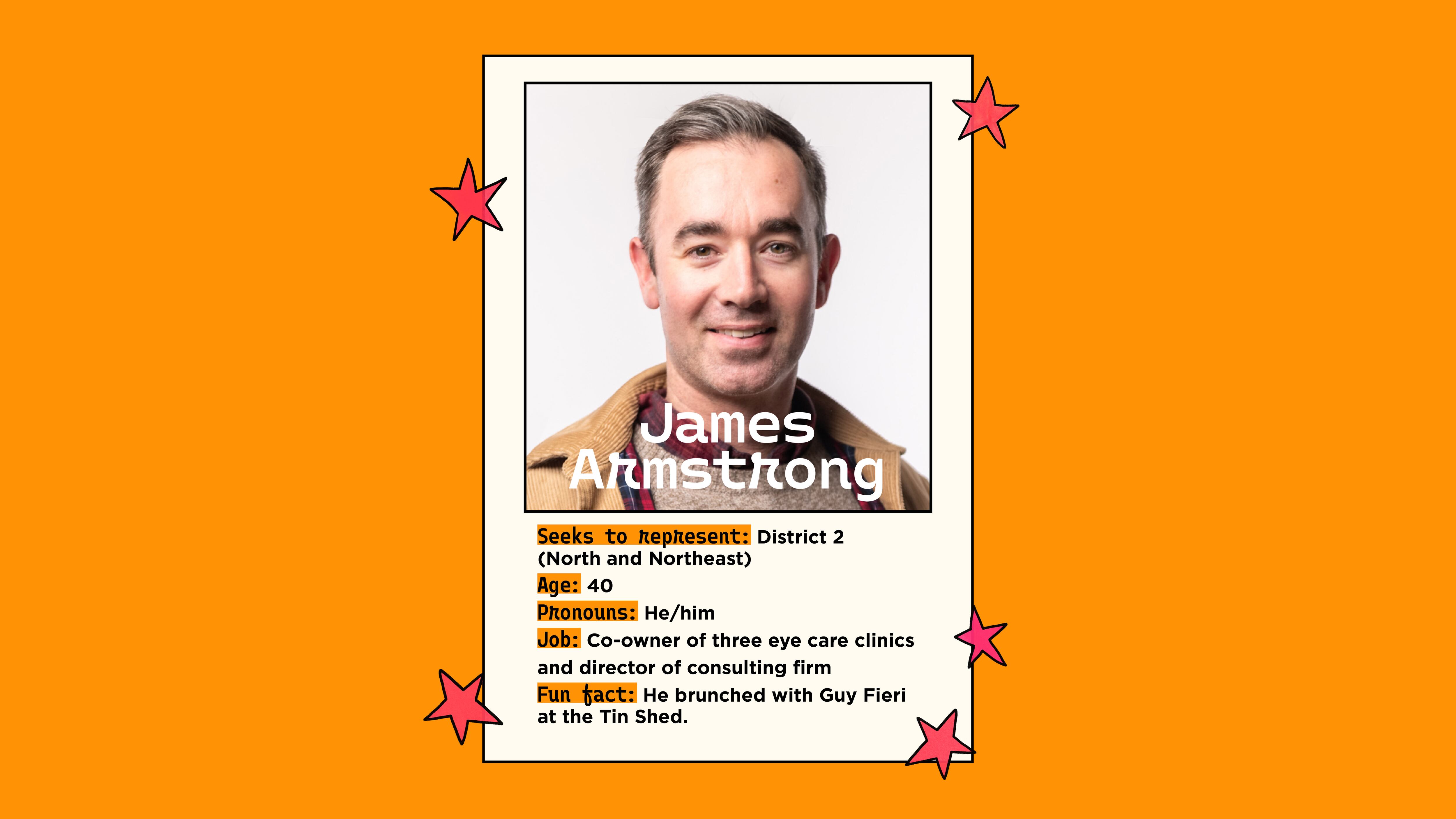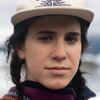Seeks to represent: District 2 (North and Northeast)
Age: 40
Pronouns: He/him
Job: Co-owner of three eye care clinics and a co-director of consulting firm
Fun fact: He brunched with Guy Fieri at the Tin Shed.
James Armstrong and his wife own three eye care businesses across District 2. It hasn’t been easy.
“We’ve been broken into more times than I can count. Insurance companies have dropped us. Our staff has been assaulted,” Armstrong says, listing incidents that have occurred over the past five years.
But Armstrong, 40, loves his neighborhood and wants to represent Northeast Portland on a brand-new City Council.
“When they drew these district maps, and I saw that District 2 is where all three of our businesses are, where we live—it’s essentially an area I don’t leave very often,” he tells WW.
Armstrong has lived in the Portland area since graduating in 2006 from the University of Oregon with a bachelor’s degree in economics, first working in Lake Oswego and then in Aloha. He and his wife moved to Portland proper in 2013 when they opened Alberta Eye Care. Since then, the couple has opened two more eye care businesses, Cathedral Eye Care and Eyestrong Pediatric Eye Care.
In addition to optometry care, Armstrong has a background in forensic accounting. He was a consultant for Berkeley Research Group for three years and is currently the director of Development Specialists.
Armstrong has received $40,000 in matching funds through the Small Donors Election program. His campaign has raised almost $64,000. He’s been endorsed by mayoral candidate Carmen Rubio, state Rep. Thuy Tran (D-Northeast Portland), United for Portland and Future Portland.
We spoke to Armstrong about his campaign. Questions and answers have been lightly edited for brevity and clarity.
WW: What are your top three priorities if elected?
James Armstrong: Number one is the homelessness crisis. For me, it’s bringing practical solutions, trying to really move the ball forward on getting people into permanent housing, getting them to support services. Number two, I really would like to see the city do a better job of supporting small businesses, not just focus on how big businesses are supported. Third, voters are frustrated with where their tax money is going, and I would really like to help restore confidence that the city can effectively use our valuable resources to provide services that people want.
Beyond policing, what measures would you take to improve public safety in Portland neighborhoods?
I think this is an opportunity to talk about Portland Street Response. The most effective way is to actually integrate it into our current police model and start shoring up what they have as far as understaffing and the calls that they’re responding to that they frankly don’t need to be.
Let’s talk about ways that we can invest in infrastructure on streets: put in barriers to slow down traffic, monitor how many cars are going through there at a given time, and just try to make it safer for people to move through our neighborhoods and just get out and about.
How would you support local businesses and foster economic growth in Portland?
The way that Portland can best support our small business districts is by much more local presence. I was the board chair of Alberta Main Street for six years, and we had a district manager who would work directly with her local businesses to identify what they needed and then be a conduit to the city. For the most part, the city has moved away from that program, and a lot of the decisions that are made, whether it’s Prosper Portland or Venture, they don’t have a lot of connection to what is actually on the ground. When they offer support through grants or marketing events, it’s in a way that doesn’t make it easy for people to take advantage of them. I’d like to see movement towards more localized investment in our small business communities.
What aspects of the city’s current approach to drug use and overdose deaths do you support and what would you change?
I think Portland has taken a very conservative approach to implementing the time and place ordinances. I would like to see more discussion about how these ordinances can be used outside of the central city. In District 2, there’s a lot more of what I would consider very dangerous activity, such as RVs being dismantled and fires. They’re happening close to schools and people’s neighborhoods. I think that it is a pretty reasonable approach for the city to say: This type of activity can’t happen.
And that goes also for around our low-barrier shelters. There hasn’t been any sort of enforcement of camping or drug dealing outside of these shelters. It’s not good for the neighbors that are around that area. It’s not good for the people that are trying to access the services. I’d like to see us be leaders and enforce some reasonable expectations around these low-barrier shelters so that they can do what they’re designed to do, which is provide people support and get them off the street.
Do you support the city staying in the Joint Office of Homeless Services? What’s your plan to address homelessness?
I do support us staying in. My personal belief is that the Joint Office needs to think bigger and take more direct action in providing solutions. I would like to see them create a headquarters and surround it with support services so that you have a physical place where we can direct people. Right now, it’s fragmented, and everybody’s pretty aware of the frustrations that exist.
Which current City Council member do you and your policies most align with?
I find that Commissioner Ryan tends to be a little bit more of a big-picture thinker like me, but I differ in tactics. In tactics, I’m much more similar to Commissioner Rubio.
How do you feel about the new structure of city government and ranked-choice voting?
I’m choosing to be optimistic. As a small business owner in the districts, having the districted representation was huge and getting the councilors out of running the bureaus needed to happen. As far as how ranked-choice voting and how the multimember districts play out, I think we’ll see.
See the other Portland City Council Candidates here!
 This article is part of Willamette Week’s Ballot Buddy, our special 2024 election coverage. Read more Ballot Buddy here.
This article is part of Willamette Week’s Ballot Buddy, our special 2024 election coverage. Read more Ballot Buddy here.

